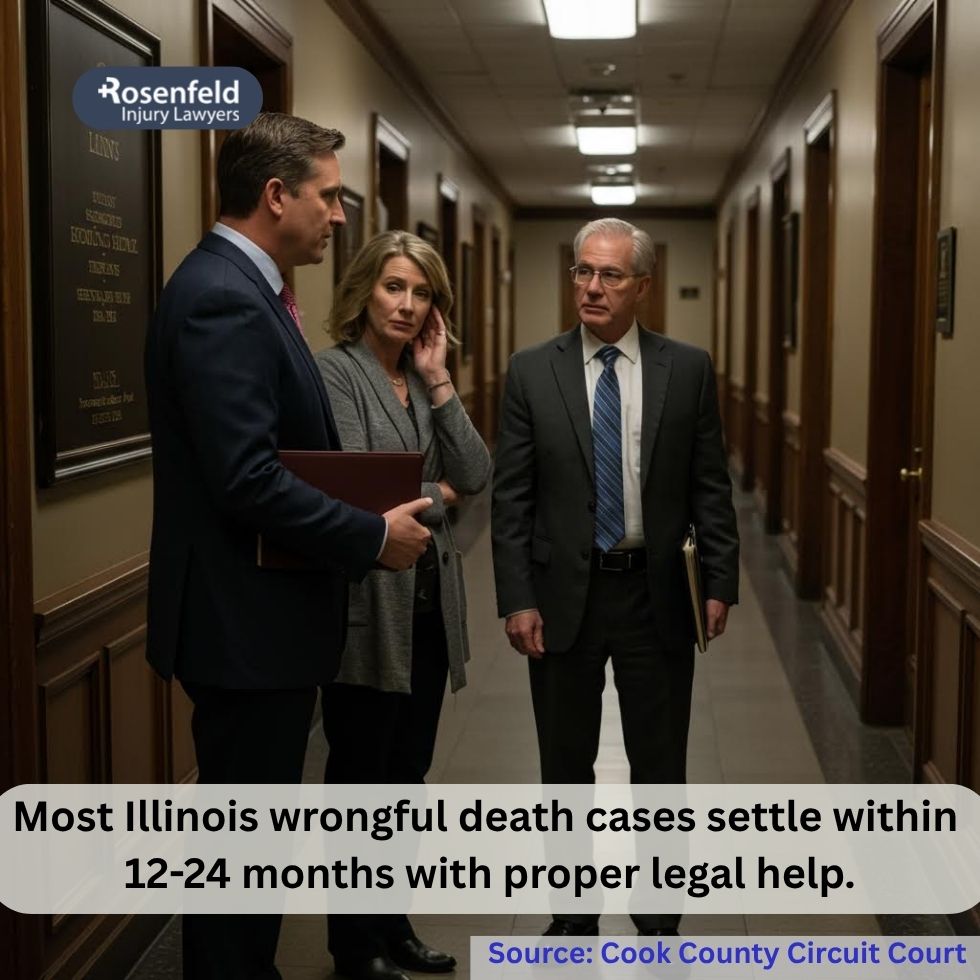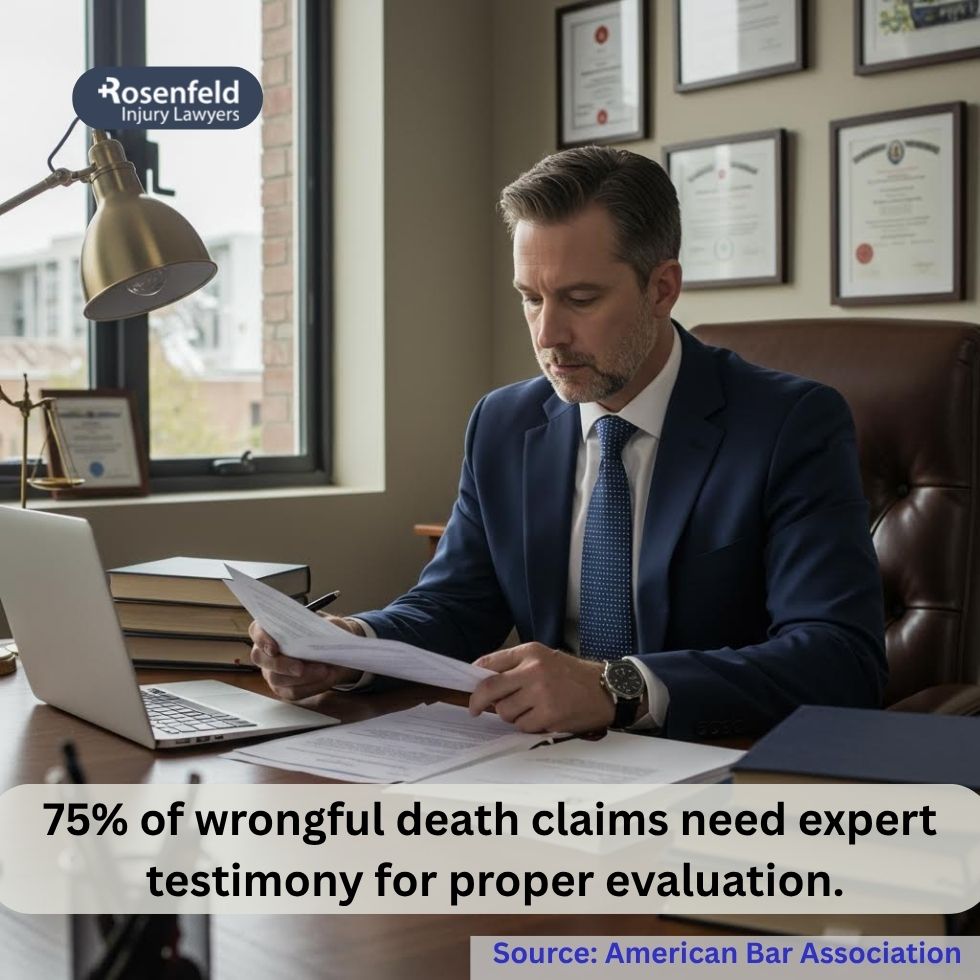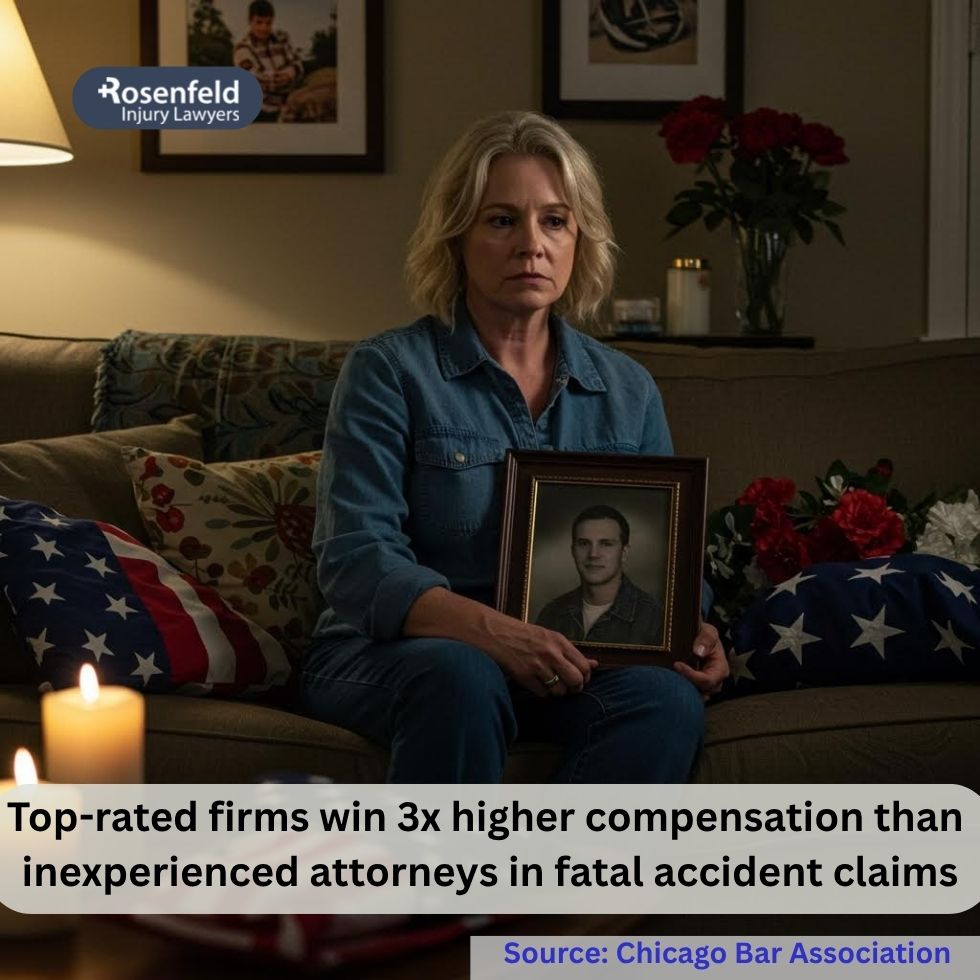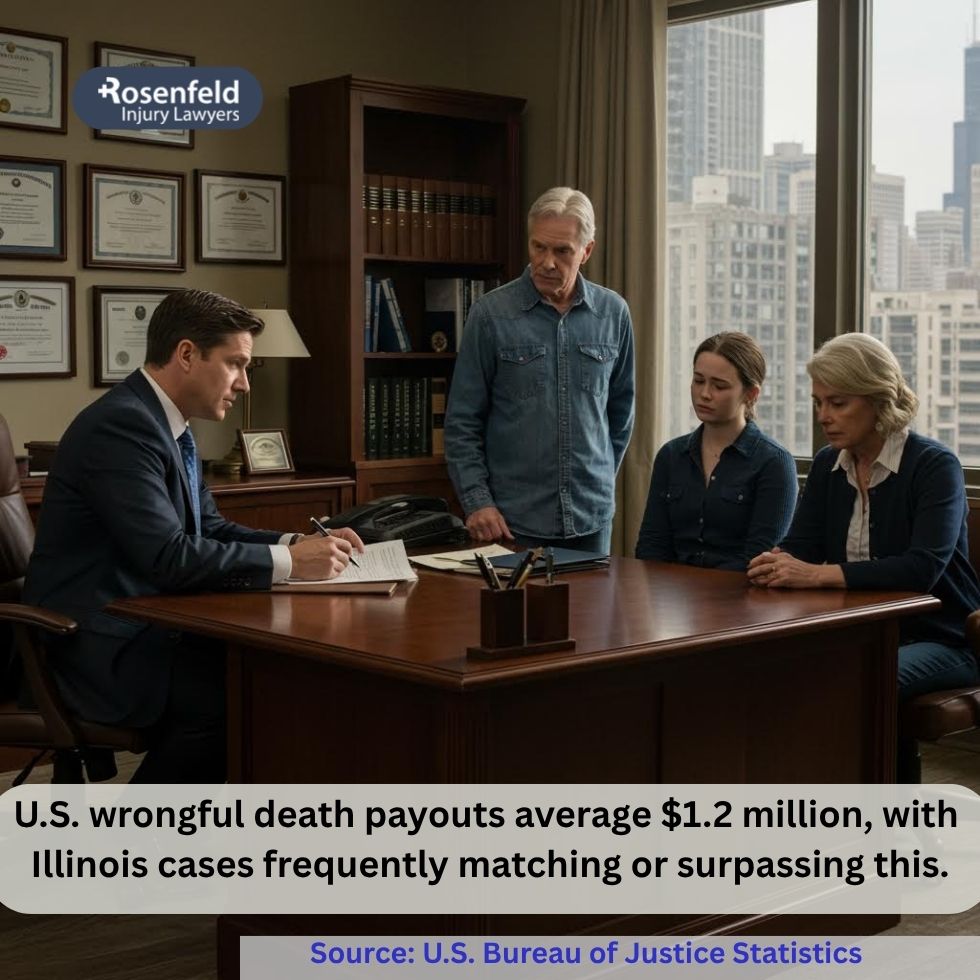- 24/7 Free Consultation: (888) 424-5757 Tap Here To Call Us
Illinois Wrongful Death Damages

When a loved one dies because of someone else’s negligence, Illinois law gives surviving family members the right to pursue financial compensation through a wrongful death claim. Illinois wrongful death damages are meant to ease the financial and emotional burden left behind, from lost income and medical bills to the deep pain of losing a parent, spouse, or child.
Under Illinois statutes, the surviving family and the deceased person’s estate may be entitled to recover specific damages, depending on the circumstances surrounding the death.
This article explains the types of damages available under the Wrongful Death and Survival Act, how courts assess compensation, and why working with an experienced wrongful death attorney in Chicago can ensure families secure the support they need after such a devastating loss.
Compensation Under Illinois Law
Illinois law recognizes that the death of a loved one can bring both financial hardship and deep emotional pain. Through a wrongful death claim, the law aims to provide compensation for these losses, both the tangible, such as lost wages and medical expenses, and the intangible, including grief, sorrow, and the loss of companionship.
A wrongful death claim allows surviving family members and the estate of the deceased to pursue fair and just compensation. This dual approach ensures the surviving children, spouse, and other next of kin are supported after an unexpected and preventable death.

The Two Main Claims: Illinois Wrongful Death & Survival Acts
Illinois law provides two separate legal avenues for seeking compensation after a preventable death: the Wrongful Death and the Survival Acts. Each addresses different types of losses stemming from the same fatal event.
The Illinois Wrongful Death Act (740 ILCS 180/) focuses on compensating the surviving spouse and next of kin. These damages reflect the family’s losses after the loved one’s death, such as lost financial support, companionship, guidance, and emotional suffering. The money awarded under this statute goes directly to the surviving family members.
The Illinois Survival Act (755 ILCS 5/27-6), on the other hand, allows the decedent’s estate to recover damages for harm suffered by the deceased person before they died. This includes medical expenses, lost wages from the time of injury to death, and conscious pain and suffering.
Any monetary compensation recovered through the Survival Act becomes part of the decedent’s estate and is distributed according to the will or state probate law.
Damages Recoverable Under the Illinois Wrongful Death Act
Wrongful death damages are awarded to the surviving spouse and next of kin to compensate them for the personal loss they suffer as a result of a loved one’s death. These damages are intended to address both financial and emotional harm. Beneficiaries can recover compensation for lost financial support, such as the decedent’s future earnings, employment benefits, and contributions to the household.
In addition to economic losses, the Act allows for recovery of non-economic damages, including grief, sorrow, and mental suffering. Surviving family members may also receive compensation for the loss of the deceased’s companionship, love, guidance, and consortium. These damages are meant to reflect the full impact of the death on the lives of close relatives and are determined by a jury based on the evidence presented.

Recovering Economic Damages for Family Members
Under 740 ILCS 180/, surviving family members have the right to recover economic damages for the financial losses resulting from a loved one’s death. These damages are intended to compensate for the measurable, tangible impacts on the family’s financial well-being.
Loss of Financial Support and Future Earnings
One of the most significant economic damages includes losing the deceased’s income and earning potential. Surviving spouses and children may be compensated for wages the person would have earned if the death had not occurred. This includes their current salary and expected future earnings, raises, bonuses, retirement benefits, and other employment-related income. The longer the person’s remaining work-life expectancy, the greater the financial loss that may be claimed.
Loss of Services, Instruction, and Guidance
The deceased often contributes far more than income to the household. Survivors may recover for the value of household services, such as childcare, transportation, and home maintenance, and for the loss of guidance, moral training, and instruction that a spouse or parent would have provided.
Funeral and Burial Expenses
Finally, a wrongful death claim allows the recovery of reasonable funeral and burial expenses, ensuring that the family is not burdened with the immediate costs following an unexpected loss.
Recovering Non-Economic Damages for Survivors in Illinois
In Illinois, survivors are entitled to recover non-economic damages under a wrongful death claim—compensation that addresses the emotional and relational losses suffered after a loved one’s death. These losses, while intangible, are often among the most deeply felt and impactful consequences of wrongful death.
Compensation for Grief, Sorrow, and Mental Suffering
Illinois stands out from many other states by expressly allowing surviving family members to seek compensation for their emotional pain. The surviving spouse and next of kin may recover for the grief, sorrow, and mental suffering they experience due to the untimely death. This includes the anguish of losing a spouse, parent, child, or sibling, and the emotional burden that comes with such a sudden and traumatic loss. These damages are not tied to financial loss but are intended to recognize the psychological toll.
Damages for Loss of Society, Companionship, and Consortium
Survivors can also recover damages for the loss of the deceased’s companionship, affection, comfort, guidance, and moral support. For a spouse, this includes the loss of a marital relationship (known legally as “loss of consortium”). For children or parents, it covers the lost opportunity to share life with someone who played a critical role in their emotional and social support system.

Damages Recoverable Under the Illinois Survival Act
Under the Illinois Survival Act (755 ILCS 5/27-6), the personal representative of the decedent’s estate can pursue damages on behalf of the deceased person for the injuries and losses they sustained before death. These are distinct from the family’s losses under the Wrongful Death Act and are meant to compensate the estate for the suffering and expenses the decedent endured between the time of the injury and their passing.
Recoverable damages under the Survival Act may include medical expenses incurred before death, lost wages the deceased would have earned in that period, and compensation for the conscious pain and suffering they experienced. If the decedent was hospitalized, underwent treatment, or lived for any time after the event that caused their death, these damages can be significant. The estate can also seek compensation for property damage resulting from the wrongful act. Any recovery under this Act is distributed to the estate and handled according to Illinois probate law.
Compensation for the Deceased’s Pre-Death Losses
Under 755 ILCS 5/27-6, the decedent’s estate can recover specific economic losses tied to the period between the injury and the deceased person’s passing. These include medical expenses related to treating the fatal injury or illness, such as ambulance costs, hospital stays, surgeries, and medications. If the decedent received care before death, those medical bills are considered compensable losses and can be claimed by the estate.
In addition to medical costs, the estate may seek compensation for wages the deceased would have earned during that interval had they survived. For example, if the person was employed and missed work between the incident date and the date of death, those lost earnings are recoverable.
These damages reflect the financial impact experienced by the deceased before death and are distinct from the losses suffered by surviving family members. Any recovery goes into the estate and is distributed per Illinois probate law.
Recovering for the Deceased’s Conscious Pain and Suffering Before Death
Under the Illinois Survival Act, the decedent’s estate may also recover non-economic damages for the conscious pain and suffering the deceased experienced between the time of injury and death. This type of compensation addresses the physical pain, emotional distress, fear, and mental anguish the person endured after the wrongful act occurred, but before they passed away.
For example, if the decedent survived for hours, days, or even weeks after a severe injury—whether from a car crash, medical error, or fall—the estate can seek damages that reflect the suffering during that period. Testimony from medical professionals, first responders, or witnesses may be used to establish the extent of awareness and discomfort.
These damages are not meant to benefit surviving relatives directly, but they become part of the decedent’s estate and are distributed according to Illinois probate law. They acknowledge the human experience of pain before death, even if brief.

Are Punitive Damages Available in Wrongful Death Cases?
Under Illinois law, punitive damages are unavailable in wrongful death actions or survival claims. The Wrongful Death Act and Survival Act allow compensation for economic and non-economic losses suffered by surviving family members and the decedent’s estate, but do not authorize punitive damages, which are intended to punish defendants for incredibly reckless or intentional misconduct.
Even if the conduct causing the death was egregious, the law limits recovery to compensatory damages only. This makes it especially important to work with a knowledgeable wrongful death attorney who can pursue every available category of damages allowed under Illinois law.
Illinois Law on Damage Caps in Wrongful Death Claims
Illinois law does not impose statutory caps on compensatory damages—economic or non-economic—in most wrongful death claims. This means that juries or judges can award damages based on the actual financial and emotional losses the surviving family members suffered without a preset limit.
However, an important exception applies to claims brought directly against the State of Illinois, subject to damage caps under the Illinois Court of Claims Act (705 ILCS 505/). In those cases, total recovery is limited regardless of the severity of the loss. An experienced wrongful death attorney can explain how these rules may apply to your case.
Factors Influencing the Value of Your Claim
Several key factors influence the value of damages in an Illinois wrongful death claim. The age and overall health of the deceased play a significant role, as younger and healthier individuals typically would have had more years to provide financial and emotional support. Earning potential is also critical—higher income and career trajectory often lead to higher damage awards.
The relationship between the deceased and surviving beneficiaries also matters; courts consider how emotionally and financially dependent family members were on the decedent. For example, a young child losing a parent may have a stronger claim for loss of guidance and support than a financially independent adult child.
The circumstances of the death—whether it was sudden, painful, or involved apparent negligence—can further affect non-economic damages like grief and mental suffering. Each wrongful death claim is unique; these elements help determine a full and fair compensation amount.
How Experienced Attorneys Calculate Wrongful Death Damages
Experienced wrongful death attorneys play a critical role in accurately determining the full value of a claim. Calculating damages goes beyond simply adding up medical bills or funeral expenses.
Future economic losses—such as the income the deceased would have earned over a lifetime—must be projected based on age, career, education, and earning capacity. This often involves working with economists or vocational experts who can assess future wages, benefits, and the present value of those figures.
Non-economic damages, including grief, sorrow, and loss of companionship, are more difficult to quantify but are no less important. Attorneys rely on testimony from family members, evidence of the deceased’s role in the household, and other supporting documentation to show the emotional and relational impact of the loss.
An experienced wrongful death lawyer will use this comprehensive approach to present a compelling case, ensuring that the family receives fair and just compensation for every loss category.
Seeking Full Compensation for Your Family’s Loss in a Wrongful Death Case

In an Illinois wrongful death case, surviving family members and the decedent’s estate are entitled to pursue a wide range of damages for both economic and non-economic losses. These may include lost financial support, funeral and burial expenses, loss of companionship, grief, and any medical costs or pain and suffering the deceased experienced before passing.
The Wrongful Death Act and Survival Act work together to ensure that compensation addresses the full impact of a loved one’s death, from tangible financial harm to the profound emotional toll on the family.
Securing the full value of these damages requires careful legal and financial analysis. An experienced attorney can help identify and support all potential claims with the necessary evidence. Families deserve to be made whole after suffering a preventable loss. By pursuing full and fair compensation, they can achieve a sense of justice and the financial stability needed to begin moving forward.
Call our Chicago personal injury lawyers at (888) 424–5757 or fill out our contact form to schedule a free consultation.
All content undergoes thorough legal review by experienced attorneys, including Jonathan Rosenfeld. With 25 years of experience in personal injury law and over 100 years of combined legal expertise within our team, we ensure that every article is legally accurate, compliant, and reflects current legal standards.







